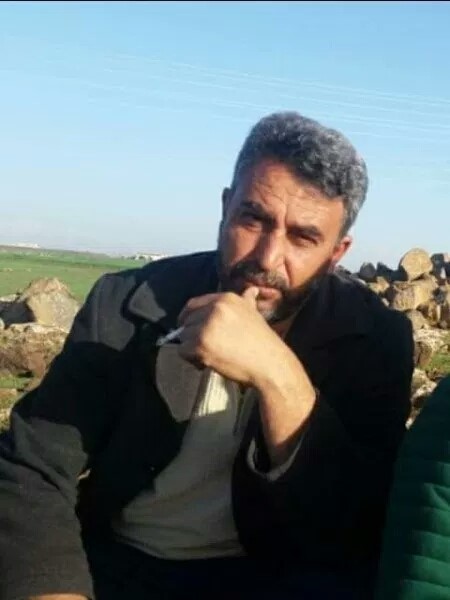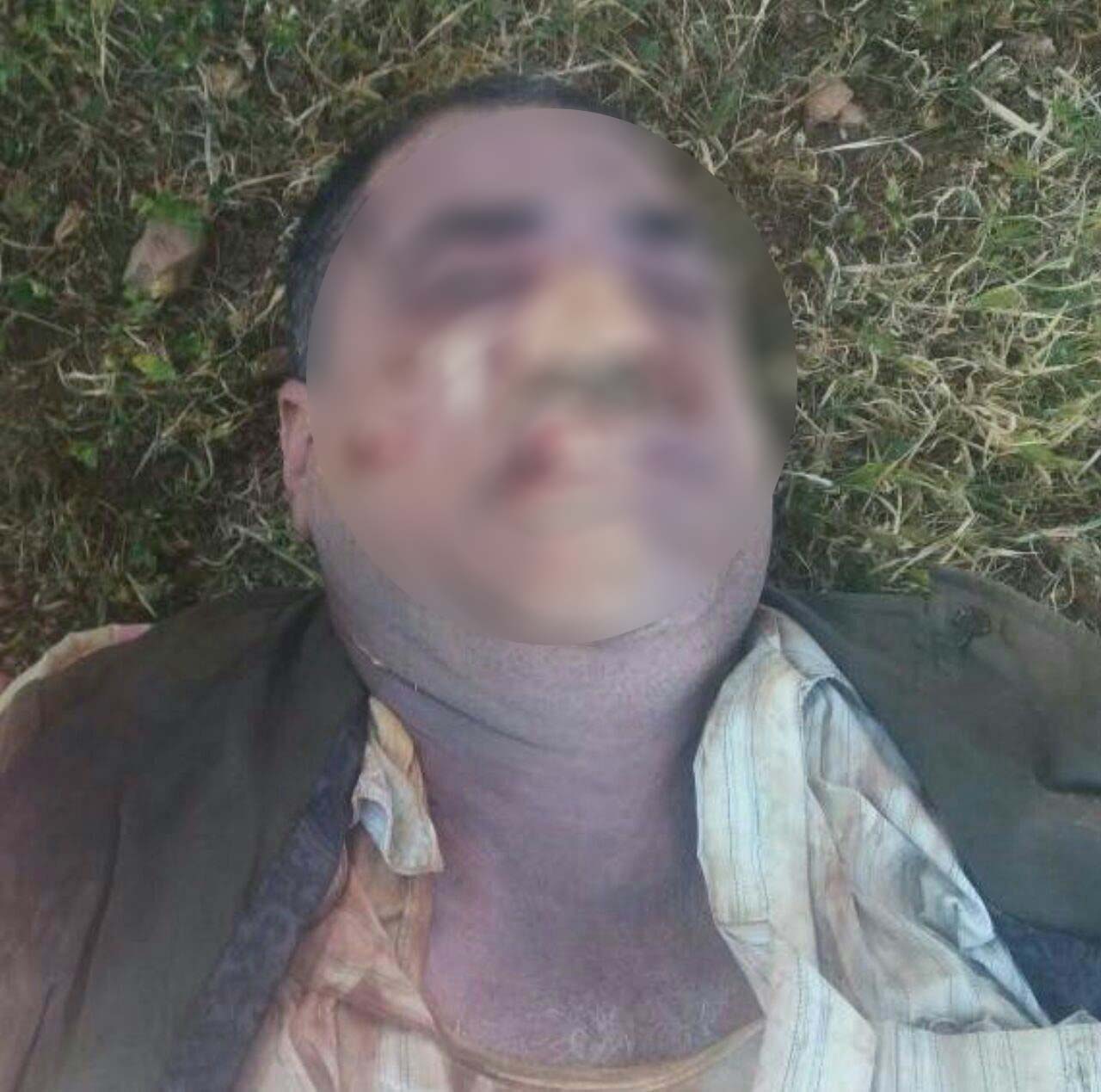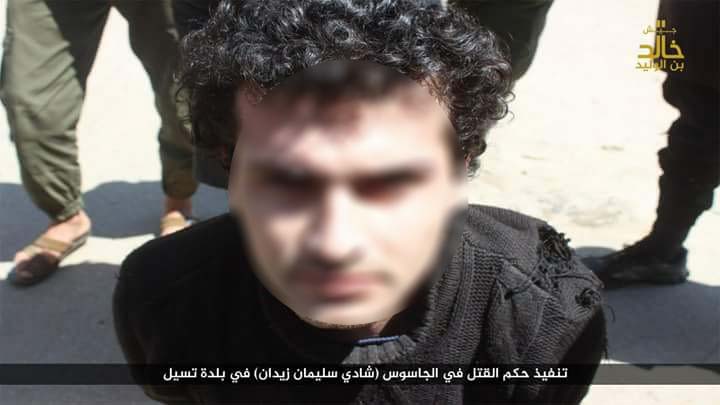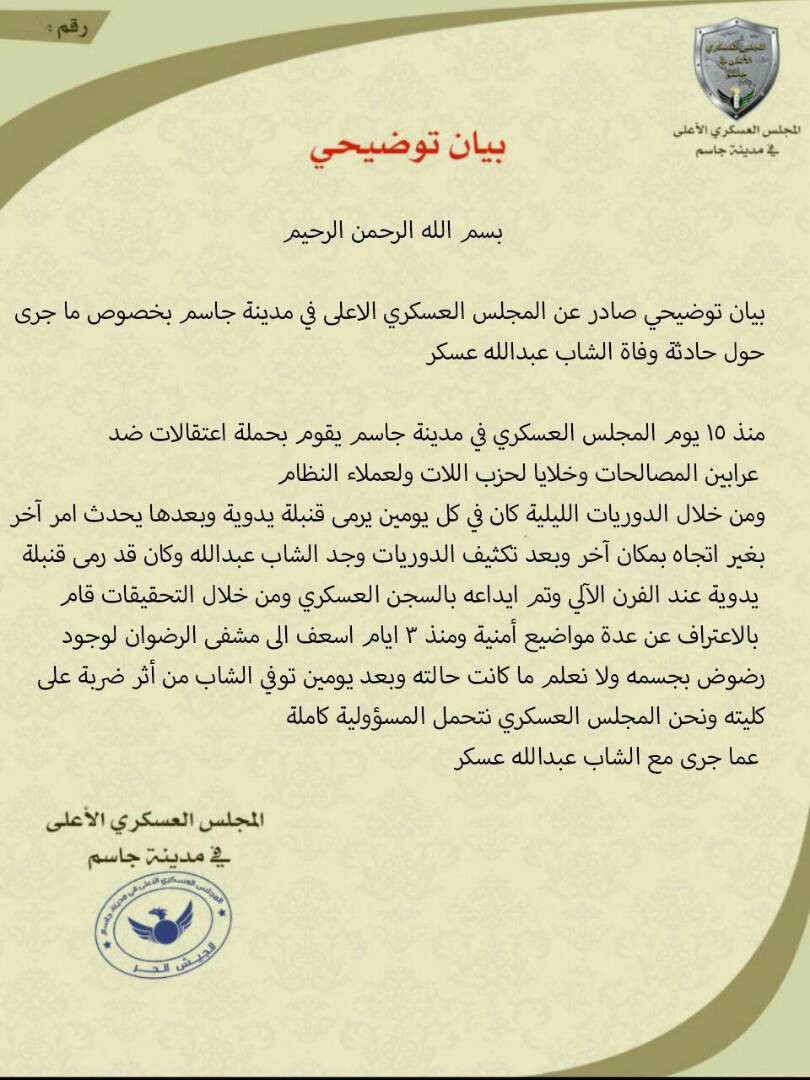Introduction: The frequency of murders and assassinations against civilians throughout Daraa province and its countryside has increased dramatically during April 2018. Insecurity and the proliferation of weapons contributed significantly in increasing such cases, as well as the lull in military operations between Syrian regular forces and Syrian armed opposition factions following the conclusion of de-escalation zone agreement[1] on July 9, 2017.
According to STJ's field researcher, the killing incidents that spread throughout Daraa province had different causes. Some of them were unintentionally and randomly, others were due to exploding of improvised explosive devices on public roads, others were due to violations of Jaysh Khalid Ibn al-Walid[2] that pledged alliance to ISIS in Hawd al-Yarmouk, others were the result of practices of some Syrian armed opposition factions in Daraa province. Moreover, he stressed that spread of killings is mainly due to the absence of security agencies that must assume responsibility for reducing those incidents, noting that in the past year, there had been up to 10 killings because of the use of weapons at social events.
STJ had earlier prepared a report titled "Increasing in Killing Incidents in Daraa under Insecurity" documenting the increase of killing incidents in Daraa during 2017.
First: Murder "Unintentionally" due to Random Shooting
Indiscriminate shooting claimed the lives of several civilians in Daraa during April 2018. Every single house in Daraa contains personal weapons to be used for self-defense, especially under insecurity and widespread of theft and kidnappings. Nonetheless, the use of weapons on occasions of Joys and sorrow and in minor dispute incidents have had a negative impact on the lives of many civilians.
In Tafas city, Apr 2, 2018, the child Mohammad Anwar Heredin was killed and seven others were injured in a wedding for the Heredin Family. Concerning this incident, Adham at-Tibi, an activist from Tafas, said:
"The young man Amjad al-Qabbati, a relative of the groom fired bullets from his gun heavily by using one of his hands as he was very happy and joyful. Although the gun ran out of bullets, the young man loaded his gun more than once and fired dozens of bullets in the sky, before he lost control on his gun, which slid directly towards the attendees and killed the child Mohammad Anwar Heredin, 13 years old, and injured seven others, one of them was in a critical condition because his injury was in the eye. The attendees dispatched the wounded to medical points. One of the wounded was brother of the shooter, Ibrahim Mohammed al-Amer, who was moderately injured but transported to a hospital in Damascus because his condition worsened. Family of the child victim pardoned the murderer on the pretext that it was unintentionally, and the shooter is still at large until this moment."
On April 2, 2018, activists published a video footage showed the random shots that were fired at the wedding of Heredin Family.
In the town of Dael, April 2, 2018, the young man Safwan Muwafaq al-Shahadat was killed after a quarrel between youths from Tafas and youths from Dael on the road that links both cities. Both parties shot fires, which caused the immediate death of the young man.
In the city of Al-Sanamayn, on 13 April 2018, Mohammed Khalil Abu Houyeh was killed affected by a gunshot, following a fight between two families because of a sum of money. In this respect, Ali al-Khalid, an activist from al-Sanamayn city told STJ,
"Khalil al-Labbad, commander of Thuwar al-Sanamayn Battalion affiliated to the Syrian armed forces, assaulted the house of Omar Abu Houyeh, who delayed in giving back a sum of money in favor of Khalil al-Labbad. After the situation and the verbal dispute evolved, a resident from the neighborhood identified as Mohammed Khalil Abu Houyeh, 45, interfered in order to ease the tension that later developed into indiscriminate shooting by elements of Thuwar al-Sanamayn Battalion towards the civilians. Consequently, a bullet was directed towards Mohammed Khalil Abu Houyeh and killed him on the spot."
A civil commission composed of several dignitaries from al-Sanamayn was formed to investigate the incident, and the case would be resolved based on the Islamic Sharia. In the light of the available data as well as testimonies of witnesses, an element of the battalion identified as Mohammed Nasser Al-Labbad was the murderer. The final decision of the case would be taken in the near future, al-Khalid said.

Image of the victim Mohammed Khalil Abu Houyeh, who was killed in a random shooting during a quarrel in Al-Sanamayn Apr 13, 2018. Photo credit: Activists of al-Sanamayn.
In Giza town, April 19, 2018, the child Qasim Ahmed Issa al-Khateeb, 3, was killed, after his five-year-old brother managed to reach his father's pistol and played with it, then suddenly a bullet came out and settled in his brother's body.
On April 24, 2018, in al-Hirak city, Hassan Ali al-Amoud was killed due to a gunshot when the armed opposition targeted a drone affiliated to the Syrian regular forces in the city.
Second: Killings Against the Backdrop of the Political Affiliation
The Syrian armed opposition controls most of Daraa province, but there are still many government institutions belonging to the Syrian government, especially in Daraa city and Izraa city, as some of the employees of those institutions are residents from armed opposition-held areas. The Syrian regime relies on many of its employees to send messages to some opposing factions or civilians outside its control, and may push them to enter into settlements[3].
The Syrian government forces have adopted this strategy in several cities and towns in Daraa province, such as al-Sanamayn, Mhajjah, Umm Walad, al-Masmiyah, Nasib, and Giza. This may put life of the employee at risk like what happened in Umm Walad village, where the engineer Mahmoud al-Balkhi was killed. In this connection, Mohammed ar-Rifa'i, an activist from Umm Walad told STJ,
"The engineer Mahmoud al-Balkhi was director of the Department of Transport and Road of the Syrian regime in Daraa city. Many locals from Umm Walad believed he had a role in inviting the villagers to conduct reconciliations/settlements with the Syrian regime, but there was no evidence of such thing. on April 2, 2018, his vehicle was halted by unidentified persons on the road between both towns al-Mesefra and west Ghariyah, while he was driving to his work place in Daraa city accompanied by a person from Khirbet Ghazaleh city. He was abducted alone, and 48 hours later, he was found dead near Umm Walad village and signs of torture were apparent on his body. Doctors were likely that he had died as a result of a myocardial infarction due to severe torture."

Image of the victim Mahmoud al-Balkhi, following his murder by unidentified persons in Daraa province, Apr 2, 2018. Photo credit: Activists from Umm Walad village.
Third: Assassinations of Persons for Anonymous Reasons
The assassination process against several civilians in Daraa province who used to provide technical support to armed opposition factions or were relatives to an opposing military commander was also observed during April 2018. A similar incident happened with Ibrahim al-Amarin, who hails from Nawa city and owns a store for maintenance the electronic devices. In this regard, Ahmed as-Saied, an activist from Nawa, spoke to STJ:
"Ibrahim al-Amarin had been a defector officer of the regime for several years, but he had not joined any armed opposition factions and preferred to live as a civilian. He worked in a store for maintenance of electronic devices, and because of his work, the opposition factions used him as a technician for war devices. One day, April 5, 2018, while he was going back home at 11:00 am, a vehicle, driven by unidentified passengers, fired him so he died at the spot. It should be recalled that he had been subjected to two assassination attempts in the past. The killers have not been identified so far."
Furthermore, on April 12, 2018, body of Ali al-Bao'uni, a native of Saida town, in the east countryside of Daraa, was found affected by a gunshot. It is worth mentioning that the victim was father of Mohammed al-Bao'uni, the commander of Mohammad bin Abdullah Brigade affiliated to the Syrian armed opposition, who was also killed along with Abdurrahman al-Mahameed on March 26, 2018. Unidentified persons shot them near al-Taebah town and the perpetrators have not been identified so far.
On the same date, April 12, 2018, body of Hasan Deherj, a native from al-Lajat area, was found thrown into the plains surrounding the town of Western Ghariyah; it was observed that he was affected with several shots. The perpetrators have not been identified so far.
Fourth: Summary Executions Carried out by Jaysh Khalid Bin al-Walid in Hawd al-Yarmouk
Jaysh Khalid Bin al-Walid that pledged alliance to the Islamic State (ISIS) carried out several summary executions against civilians whom were charged of dealing with the Syrian regular forces or dealing with the opposition factions.
For example, Apr 1, 2018, Jaysh Khalid Bin al-Walid executed the civilian Naji Mostafa al-Mostafa, head of the Municipal of Abdeen village after it arrested him while he was on the way to Daraa province to receive his salary. He was charged of dealing with the Syrian regular forces.
Moreover, Apr 7, 2018, Jaysh Khalid Bin al-Walid also executed Shady Suleiman az-Zedan, a native from Koya village, in front of all the people in Tasil town; Shady was charged of being dealing with the opposition factions.

Image of the victim Shady Suleiman az-Zedan, who was executed summarily by Jaysh Khalid Bin al-Walid in Tasil town on April 7, 2018. Photo credit: family of the young man Shady Suleiman az-Zedan.
The same group also executed Mohammed Khalid at-Ta'ani, who hails from Saham al-Golan, after accusing him of dealing with the Syrian armed opposition.
Furthermore, the same group, Jaysh Khalid Bin al-Walid, was responsible for killing several civilians in Daraa province as it shelled armed opposition-held villages during April 2018. For example, on April 19, 2018, the group was attempting to seize Masaken Jeleen village and it targeted the village with several rocket missiles killing by that Mrs. Amira Ali Merehel, and wounding two others. In addition, on April 23, 2018, the group launched ground-based anti-aircraft weapons on Hit town killing Suleiman Aref at-Ta'ani.
On April 14, 2018, Youssef Mousa az-Zobani was killed in the group-held Saham al-Golan town due to random gunshots by anonymous source.
Fifth: Killings by Using Improvised Explosive Devices
The improvised explosive devices planted along roads of Daraa province constitute a great risk on lives of the civilians because it had claimed lives of dozens of civilians during 2017 and 2018. STJ had published an enlarged report concerning this incident. But in April 2018, five civilians were documented killed as a result of detonation of improvised explosive devices in the east countryside of Daraa. The first incident of those was Apr 11, 2018, when both Dahham Mohammed al-Odallah along with Ghassab Salim al-Odallah were killed while passing the road (Satah Zahnan- al-Baeiyat) in al-Lajat area.
The second incident was on the same day when Adham Farhan an-Nazzal was killed on the road (al-Karak- Rakham), besides Abdullah Mohammed Abdlghani al-Harraky, from Western Meliha, was killed on the same day as a result of a detonation of a mine from remnants of the Syrian regular forces around the town. Whereas the third incident was on April 15, 2018, when Ismael Hussein al-Youssef, from al-Lajat, was killed on the road (Shaara- Karim).
Sixth: The Death of a Civilian in a Prison of the Syrian Armed Opposition
On April, 26, 2018, the Supreme Military Junta,[4] affiliated to the armed opposition in Jasim city, declared its responsibility for the death of the young man Abdullah Nabil Askar in its jail. The young man had been arrested days before his death on charges of throwing a hand grenade near the automatic bakery within Jasim city. The Military Junta stated that the young man died as result of a strike on his kidneys during the interrogation.
It should be noted that since Apr 13, 2018, the Military Junta has been conducting a wide arrest campaign against what it called "godfather of reconciliations and cells of the Syrian regime and Hezbollah", and has imposed a curfew at night, in addition it posted a video showing a person admitting his loyalty to Hezbollah and the implementation of security operations in favor of the Syrian regime.

An image shows the statement released by the Supreme Military Junta in Jasim city on April 26, 2018, in which it declared its responsibility for the death of the young man Abdullah Askar.
Photo credit: Facebook page of the Supreme Military Junta in Jasim.
Seventh: Proposed Recommendations
To the security and concerned authorities in Syrian armed opposition- controlled areas in Daraa province:
Security Agencies as well as the military factions of the armed oppositions must assume responsibility to end the widespread killing incidents through several solutions,
- The supreme commanders of the armed oppositions should condemn violations of human rights and breaches of the International Humanitarian Law including an obvious condemnations of all operations of abductions, enforced disappearance, arbitrary detention, torture and other degrading humiliating treatment, as well as the use of severe degrading penalty, unfair trials, summary executions.
- To order their followers that violations of International Humanitarian Law and violations of International Human Rights Law should not be tolerated under any circumstances. To make them perceive these principles and laws, and that the perpetrators will be prosecuted and held accountable.
- To hold accountable all members in case they are involved in committing or ordering to commit violations of International Humanitarian Law- including potential war crimes-and violations to the articles of International Human Rights Law.
- To cooperate with independent and impartial investigations on violations of International Humanitarian Law, including the Independent International Commission of Inquiry on the Syrian Arab Republic (IICIS), the International Impartial and Independent Mechanism of the United Nations (IIIM), and Syrian rights organizations.
- To activate security points on the roads, which link neighboring villages in Daraa province and its countryside, and protect civilians. If any person is arrested, the necessary procedures should be followed, for example, telling him why he is arrested, treating him in a non- degrading manner and presenting him to the competent authority without delay.
- To attempt to confine the weapon in the hands that are aware of the responsibility and danger of using it. To punish those who seek weapons without a security license, and to establish a robust monitoring mechanism that enable verification prior to the transfer of any weapons, ammunition or military equipment.
- To restructure bodies concerned with local security to ensure that they are more consistent with the security requirements of the current phase.
[1] On September 1 4, 2017, the sixth round of Astana Talks was convened and the sponsor states of (Russia, Turkey and Iran) agreed on several points according to the statement issued at the end of the conference. Among the points was the announcement of de-escalation zone according to the Memorandum on May 4, 2017. It included Eastern Ghouta, some parts of Idlib province and of northern Homs province as well as some parts of adjacent provinces (Latakia, Hama, and Aleppo) and some parts of southern Syria-they were not identified accurately- but entered de-facto in escalation zone agreement on July, 9, 2017, after the USA, Russia and Jordan announced a ceasefire south of Syria. The ceasefire includeed provinces of Daraa and Qunaitra, but until this moment, the de-escalation zone is not geographically bordered. On August 23, 2017, the Russian Ministry of Defense declared that joint monitoring center of Southern Syrian de-escalation zone (south of Daraa and Qunaitra) started in accordance with the agreements reached in the framework of the negotiations among Russia, the USA, and Jordan.
[2] It was formed after the merger of several anti-Syrian regime factions, including Islamic Mouthana Movement and Al-Yarmouk Martyrs Brigade, and it was announced in June 2016. Number of its fighters are estimated about 800 elements. It is currently scattered in several towns in Daraa countryside like (al-Shajara, Jamla, Ein Thakar, al-Qusayr, Adwan, Tasel, Nafa'ah, Saham el-Golan, Jeleen, al-Muzaira, al-Shabraq, Beit Irah, Koya and Maariye).
[3] "Settlement" means access to a particular type of agreement with Syrian government forces, and includes various forms of items, including the dismantling of siege, stopping shelling by the regular army and the introduction of foodstuffs among others. The reconciling items in Syria vary from one region to another and the term "settlement" differs from the term "truce or cessation of hostilities or cease-fire", and sometimes in the Syrian context it refers to the neutralization of the area and its subordination to the control of the central government in Damascus.
[4] It is the executive authority in Jasim and consists of all the opposition factions acting in Jasim like (al-Ababeel Army, Alliance of Southern Forces, Brigade of al-Ababeel Nights).

